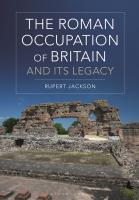
Bloomsbury (2020) p/b 360pp £27.99 (ISBN 9781350149373)
With Britain poised to leave the European Union, now is a good time to reconsider her relationship with and withdrawal from another continental power bloc, the Roman Empire. J. does so with aplomb. Writing with forensic clarity and tireless wit in an easy style belying exhaustive scholarship, he sets out to explore three main themes: why the Romans sought to subdue and occupy territory that was (in his view) economically unprofitable; how they achieved this; and what the impact of ‘Romanisation’ was on Britain. J’s answer to this last question is: ‘profound’—not just the location of many English cities but Scotland’s sense of independent nationhood and London’s identity as a major financial centre all owe much, he argues, to Roman policy.
Throughout his discussions, J. is keenly aware of the need to reconcile often contradictory sources from the most up-to-date archaeological evidence (including the Bloomberg tablets discovered in 2010-13) to a wealth of recent scholarly material (much from the past decade) as well as sometimes dubious historical literature (his handling of fourth- and fifth-century AD panegyrics is particularly nimble, as he pans their cringing effusiveness for nuggets of truth) and his success in making judicious sense of disparate evidence combined with his firm grasp of political expediency and human nature leads to sometimes startling, but always defensible, conclusions (for example that until at least the early third century AD it was the Romans’ ambition to conquer the whole of Scotland).
After a consideration of the sources and an excellent overview of Bronze Age England, including its relationship with the continent, much of the book proceeds chronologically with each chapter generally containing an historical narrative followed by discussions of issues arising. At the end of what might legitimately be called the (longer) first half (up to and including the Flavian Period) J. offers digressions on life on the Northern Frontier and the Romanization of Britain in the first Century, while at the end of the second (once the legions have departed in 409 AD) he tackles the big themes of urban and country life, religion and the legacy of occupation.
Works on Roman Britain are legion, and inevitably some of the ground that J. is treading is not new. However, while some scholars might quibble with some details, several things make this book stand out, not least its dry, often pertinent humour, which makes the reader want to power ahead, and instances of which made this reviewer laugh aloud (on Tacitus: ‘it is a brave man who publishes books about his wife’s family’; on the four-year-old Valentinian II, appointed Valentinian I’s successor: ‘despite his father’s optimism, [he] did not yet have any great grasp of statesmanship’; on Caratacus treating for his life in Rome: ‘this incident affords an early example of the benefits of learning Latin’). But more than anything, its strength lies in the fact that it does not treat the peoples of occupied Britannia as one amorphous whole, but rather explores how different regions and social classes experienced the consequences of Roman rule and values. It is thoroughly modern in its outlook, too, not least in its awareness of the need to decolonialize the curriculum and explore the often-destructive consequences of imperialism.
With footnotes, an exhaustive bibliography, a useful index, 31 black-and-white photographs, 2 tables and 3 maps (I could have done with more), this volume is steeped in scholarly research. But it is not aimed at a scholarly audience. Rather, with its clear and easy style that brings Roman Britain with all its complexities and contradictions hustling and bustling back into life, it is written for students and general readers. There should be at least one copy in every library, for this deserves to be a go-to book for many years to come—even after the Brexit dust has settled.
David Stuttard
